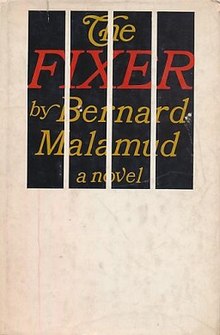The Fixer (novel)
This article needs additional citations for verification. (January 2012) |
 First edition | |
| Author | Bernard Malamud |
|---|---|
| Language | English |
| Publisher | Farrar, Straus & Giroux |
Publication date | 1966 |
| Publication place | United States |
| Media type | |
| Preceded by | Idiots First (1963) |
| Followed by | Pictures of Fidelman (1969) |
The Fixer is a novel by Bernard Malamud published in 1966 by Farrar, Straus & Giroux. It won the U.S. National Book Award for Fiction (his second)[1] and the Pulitzer Prize for Fiction.[2]
The Fixer provides a fictionalized version of the Beilis case. Menahem Mendel Beilis was a Jew unjustly imprisoned in Tsarist Russia. The "Beilis trial" of 1913 caused an international uproar and Beilis was acquitted by a jury.
The book was adapted into a 1968 film of the same name starring Alan Bates (Yakov Bok) who received an Oscar nomination.
Plagiarism controversy
Descendants of Mendel Beilis have long argued that in writing The Fixer, Malamud plagiarized from the 1926 English edition of Beilis's memoir, The Story of My Sufferings. One of Beilis's sons made such claims in correspondence to Malamud when The Fixer was first published. A 2011 edition of Beilis's memoir, co-edited by one of his grandsons, claims to identify 35 instances of plagiarism by Malamud.[3]
Responding to the allegations of plagiarism made by Beilis's descendants, Malamud's biographer Philip Davis acknowledged "some close verbal parallels" between Beilis's memoir and Malamud's novel. Davis argued, however, "When it mattered most, [Malamud's] sentences offered a different dimension and a deeper emotion."[4]
Jewish Studies scholar Michael Tritt has characterized the relationship between Malamud's The Fixer and Beilis's The Story of My Sufferings as one of "indebtedness and innovation".[5]
Censorship
The book was banned by the board of education of the Island Trees Union Free School District in New York, which was the subject of a U.S. Supreme Court case in 1982.[6]
In popular culture
In episode 7 of Mad Men Season 5, the character Don Draper is seen reading the novel in bed and recommending it to his wife Megan.
References
- ^
"National Book Awards – 1967". National Book Foundation. Retrieved 2012-03-30.
(With essay by Harold Augenbraum from the Awards 60-year anniversary blog.) - ^ "Fiction". Past winners & finalists by category. The Pulitzer Prizes. Retrieved 2012-03-30.
- ^ Beilis, Mendel. Blood Libel: The Life and Memory of Mendel Beilis, ed. Jay Beilis et al. (2011)
- ^ Davis, Philip. Bernard Malamud: A Writer's Life (2007), pp. 241–43
- ^ Tritt, Michael. "Mendel Beilis's The Story of My Sufferings and Malamud's The Fixer: A Study of Indebtedness and Innovation", Modern Jewish Studies 13, no. 4 (Summer, 2004), p. 70
- ^ "Island Trees Sch. Dist. v. Pico by Pico 457 U.S. 853 (1982)". Justia. Retrieved 30 September 2015.
- 1966 American novels
- Novels about antisemitism
- Pulitzer Prize for Fiction-winning works
- Jews and Judaism in the Russian Empire
- American novels adapted into films
- Novels by Bernard Malamud
- Novels set in Ukraine
- Novels set in Kyiv
- Novels set in Russia
- National Book Award for Fiction winning works
- Farrar, Straus and Giroux books
- Novels involved in plagiarism controversies
- Censored books


